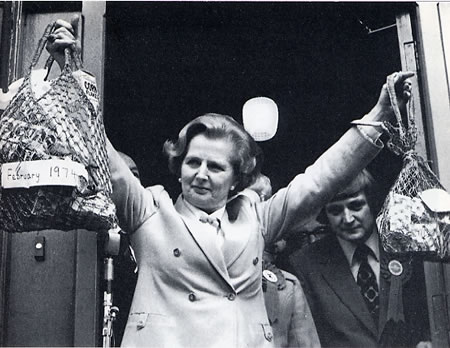 On May 4th 1979, the Oxford-educated chemist and lawyer, Margaret Thatcher, leader of the Conservative Party, was sworn in as Britain’s first female prime minister, the day after the Conservatives won a 44-seat majority in general parliamentary elections.
On May 4th 1979, the Oxford-educated chemist and lawyer, Margaret Thatcher, leader of the Conservative Party, was sworn in as Britain’s first female prime minister, the day after the Conservatives won a 44-seat majority in general parliamentary elections.
She was born Margaret Hilda Roberts in Grantham, Lincolnshire, England, on October 13th 1925. Roberts attended Huntingtower Road Primary School and won a scholarship to Kesteven and Grantham Girls’ School. Her school reports showed hard work and continual improvement; her extracurricular activities included the piano, field hockey, poetry recitals, swimming and walking. She was head girl in 1942–43.
In her upper sixth year she applied for a scholarship to study chemistry at Somerville College, Oxford but was initially rejected, and was offered a place only after another candidate withdrew. She arrived at Oxford in 1943 and graduated in 1947 with Second Class Honours in the four-year Chemistry Bachelor of Science degree; in her final year she specialised in X-ray crystallography under the supervision of Dorothy Hodgkin.
She was the first woman president of the Oxford University Conservative Association and in 1950 ran for Parliament in Dartford. She was defeated but garnered an impressive number of votes in the generally liberal district. In 1959, after marrying businessman Denis Thatcher and giving birth to twins, she was elected to Parliament as a Conservative for Finchley, a north London district. During the 1960s, she rose rapidly in the ranks of the Conservative Party and in 1967 joined the shadow cabinet sitting in opposition to Harold Wilson’s ruling Labour cabinet. With the victory of the Conservative Party under Edward Health in 1970, Thatcher became secretary of state for education and science.
In 1974, the Labour Party returned to power, and Thatcher served as joint shadow chancellor before replacing Edward Health as the leader of the Conservative Party in February 1975. She was the first woman to head the Conservatives. Under her leadership, the Conservative Party shifted further right in its politics, calling for privatisation of national industries and utilities and promising a resolute defence of Britain’s interests abroad. She also sharply criticised Prime Minister James Callaghan’s ineffectual handling of the chaotic labour strikes of 1978 and 1979.
In March 1979, Callaghan was defeated by a vote of no confidence, and on May 3 a general election gave Thatcher’s Conservatives a majority in Parliament. Sworn in the next day, Prime Minister Thatcher immediately set about dismantling socialism in Britain. She privatised numerous industries, cutback government expenditures, and gradually reduced the rights of trade unions. In 1983, despite the worst unemployment figures for half a decade, Thatcher was re-elected to a second term, thanks largely to the decisive British victory in the 1982 Falklands War with Argentina.
In other foreign affairs, the “Iron Lady” presided over the orderly establishment of an independent Zimbabwe (formerly Rhodesia) in 1980 and took a hard stance against Irish separatists in Northern Ireland. In October 1984, an Irish Republican Army (IRA) bomb exploded at the Conservative Party conference in Brighton. The prime minister narrowly escaped harm.
In 1987, an upswing in the economy led to her election to a third term, but Thatcher soon alienated some members of her own party because of her poll-tax policies and opposition to further British integration into the European Community. In November 1990, she failed to received a majority in a challenge for her leadership. After seeing the Queen, calling other world leaders, and making one final Commons speech, she left Downing Street in tears. She regarded her ousting as a betrayal.
She withdrew her nomination, and John Major, the chancellor of the Exchequer since 1989, was chosen as Conservative leader. On November 28th, Thatcher resigned as prime minister and was succeeded by Major. Thatcher’s three consecutive terms in office marked the longest continuous tenure of a British prime minister since 1827. In 1992, she was made Baroness Thatcher, of Kesteven in the County of Lincolnshire, and took a seat in the House of Lords.
In later years, Thatcher has worked as a consultant, served as the chancellor of the College of William and Mary and written her memoirs, as well as other books on politics. Margaret Thatcher continues to work with the Thatcher Foundation, which she created to foster the ideals of democracy, free trade and cooperation among nations.
Related articles
- Margaret Thatcher Regrets Revealed in New Book (foxnews.com)
Discover more from Craig Hill
Subscribe to get the latest posts sent to your email.


Never liked her …. but interesting reading again, Craig
Interesting lady…
There is nothing sexier than a strong, smart, in your face kind of woman to keep one honest. Loved her from afar!
One of my idols
About her: